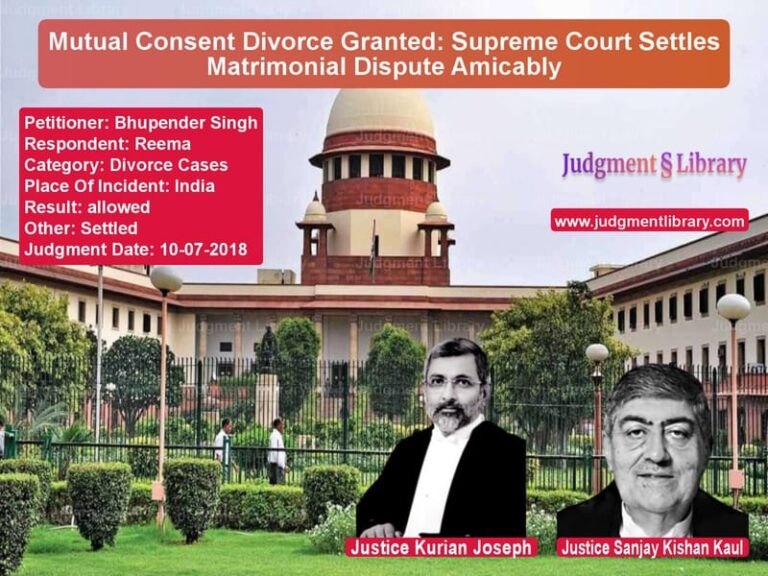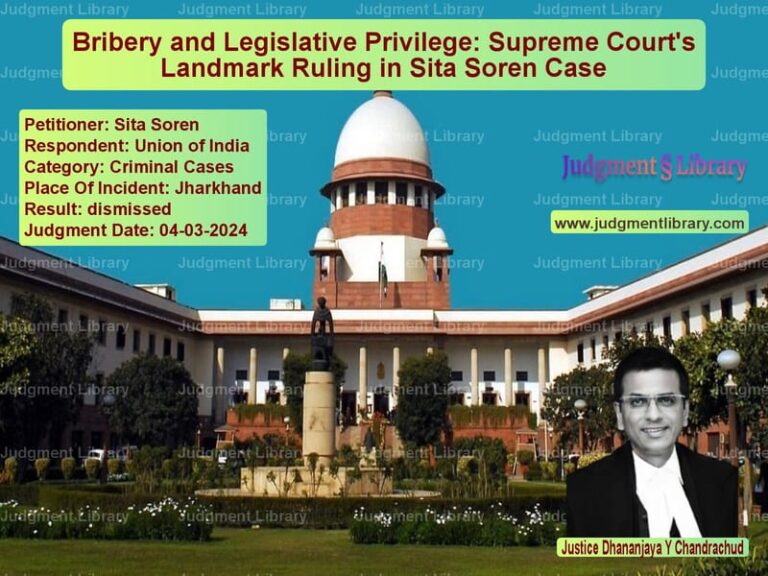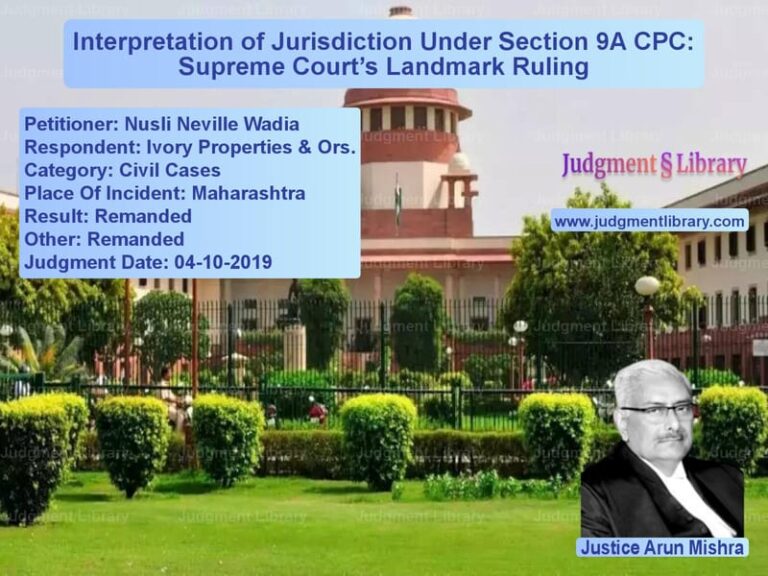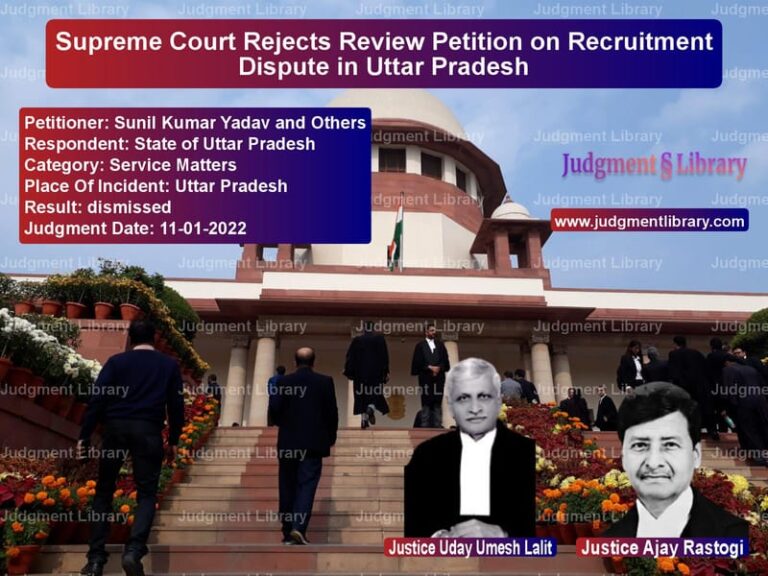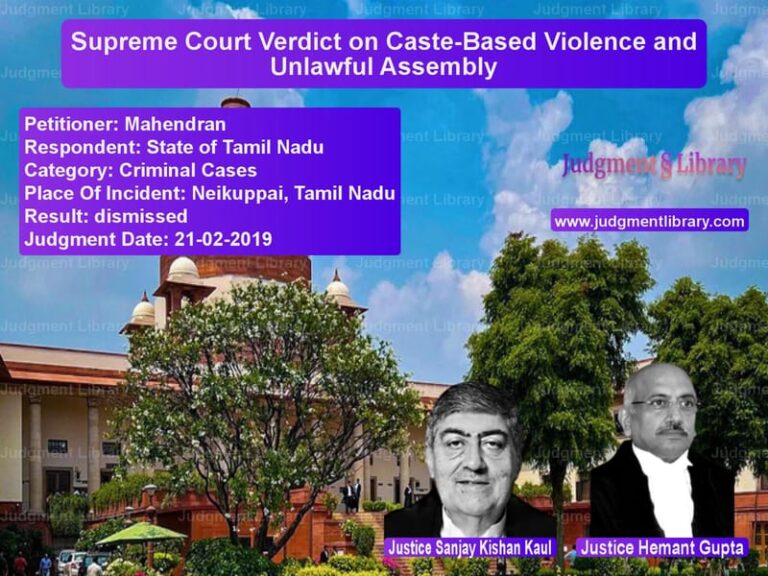Supreme Court Facilitates Settlement in Kerala Rape and Cheating Case Through Financial Compensation
In a landmark judgment that highlights the Indian judiciary’s evolving approach to criminal justice, the Supreme Court recently facilitated an amicable settlement in a sensitive case involving serious allegations of rape, cheating, and criminal intimidation. The judgment delivered on September 15, 2025, brings closure to a protracted legal battle that had been ongoing since 2022, demonstrating the Court’s willingness to explore alternative dispute resolution even in criminal matters when both parties express a desire to resolve their differences.
The case involved an appellant identified only as ‘X’ and a woman referred to as the prosecutrix. The dispute originated from Kerala, where the prosecutrix had filed a complaint alleging multiple serious offenses against the appellant. What makes this case particularly significant is how the Supreme Court moved beyond traditional adversarial proceedings to help the parties reach a mutually acceptable resolution.
The Background of the Case
The prosecutrix had filed her complaint on May 24, 2022, at the Balussery Police Station in Kozhikode. She narrated a complex story of her relationship with the appellant. She was married to one Najeeb since December 2010 and had two children from the marriage, but the couple had been living separately for six years, with divorce proceedings pending before the Family Court. During this difficult period, the appellant entered her life, initially offering to help her with the ongoing litigation.
According to her complaint, the relationship took an unpleasant turn in December 2017 when the appellant invited her to his house, took her to his bedroom, and subjected her to sexual intercourse forcefully against her will. She further alleged that he had taken her photographs and threatened to send them to her husband if she disclosed the incident to anyone. The prosecutrix claimed that in 2018, the appellant repeatedly promised to marry her and committed sexual intercourse on multiple occasions by inviting her to his friend’s house. Relying on these promises of marriage, she stated that she stayed with him at various resorts in 2022.
The financial dimension of the case emerged when she alleged that the appellant had obtained Rs. 3,54,000 and gold ornaments worth 2.5 sovereigns from her on different occasions. When she demanded the return of her money and jewelry, the appellant allegedly refused, leading to additional accusations of cheating.
The Legal Proceedings Begin
Based on this detailed complaint, the police registered FIR No.333/2022, alleging serious offenses under Sections 376(2)(n) (repeated rape), 406 (criminal breach of trust), and 506 (criminal intimidation) of the Indian Penal Code. The appellant, fearing arrest, approached the High Court of Kerala seeking anticipatory bail. However, the High Court, in its order dated July 6, 2022, dismissed his application, noting that the specific allegation of rape required custodial interrogation.
Not satisfied with this outcome, the appellant then filed a petition under Section 482 of the Code of Criminal Procedure before the High Court, seeking the quashing of the FIR itself. This petition too met with dismissal when the High Court, in its order dated November 8, 2024, observed that the allegations required proper investigation and that judicial interference at that stage was unwarranted. Aggrieved by both these orders, the appellant approached the Supreme Court through special leave petitions.
The Supreme Court’s Intervention
The Supreme Court’s involvement marked a decisive turning point in the case. On December 19, 2024, the Court issued notice in the matter and, significantly, ordered that no coercive steps be taken against the appellant. This interim protection proved crucial in creating an environment conducive to settlement discussions.
The Court took a particularly proactive stance on March 20, 2025, when it granted liberty to the parties to arrive at an amicable settlement. This encouragement for a negotiated resolution set the stage for what would become the final outcome of the case. The appellant, responding to the Court’s suggestion, made a significant submission on July 21, 2025, stating that in order to give a quietus to the entire dispute, he is willing to return the amount as well as the gold ornaments.
This was followed by a more concrete undertaking on August 18, 2025, where the appellant submitted that he shall deposit the amount of Rs.3,54,000 before the concerned Trial Court within a period of three weeks and is also willing to return the gold ornaments to the prosecutrix or her father with an appropriate acknowledgement.
The Supreme Court’s Final Judgment
After hearing learned counsel for both parties, the Supreme Court bench comprising Justices B.V. Nagarathna and R. Mahadevan formalized the settlement through its judgment. The Court’s order was precise and practical, focusing on the implementation of the settlement terms.
The Court directed that the amount of Rs.3,54,000, which had been deposited by the appellant before the Trial Court (Judicial Magistrate of First Class-II, Perambra), shall be permitted to be withdrawn either by the second respondent or the nominee of the second respondent. The Court specified that if such an application is made on behalf of the second respondent, the same shall be released to the second respondent or her nominee after due verification.
Regarding the gold ornaments, the Court ordered that gold weighing 20.040 grams which the appellant is willing to return to the second respondent, shall be deposited before the Registrar General of the Kerala High Court. The Court further directed the Registrar General to receive the aforesaid gold from the appellant and retain the same in safe custody. The judgment specified that the said gold shall be released either to the second respondent or to her nominee, and in the event a request is made by way of an application, the Registrar General shall hand over the gold to the second respondent or her nominee after due verification.
With these comprehensive directions ensuring the return of both the monetary amount and the gold ornaments, the Supreme Court allowed the appeal arising out of SLP (Crl.) No.17845/2024 and disposed of the connected appeal arising out of SLP (Crl.) No.18408/2024 in the same terms.
Implications and Significance
This judgment represents a significant development in Indian criminal jurisprudence. While the Court did not delve into the merits of the allegations or make any determination about guilt or innocence, it successfully facilitated a resolution that both parties found acceptable. The case demonstrates the Supreme Court’s flexibility in handling criminal matters where parties express a willingness to settle.
The judgment raises important questions about the nature of justice in cases involving serious allegations. By focusing on the restitution of the financial aspects while leaving the criminal allegations unresolved through the settlement process, the Court has highlighted the complex interplay between different types of grievances that can exist within a single case.
This approach, while controversial in the context of rape allegations, acknowledges the practical reality that prolonged litigation can be emotionally and financially draining for all parties involved. The Court’s intervention provided a pathway for closure, particularly for the prosecutrix who recovered her money and gold, thereby achieving at least partial redressal of her grievances.
The judgment stands as an important precedent for how courts can exercise their discretionary powers to encourage settlements even in criminal matters, particularly when the parties themselves indicate a desire to resolve their dispute amicably. It reflects the judiciary’s recognition that justice can sometimes be better served through restorative approaches rather than purely punitive ones.
Petitioner Name: X.Respondent Name: State of Kerala & Another.Judgment By: Justice B.V. Nagarathna, Justice R. Mahadevan.Place Of Incident: Balussery, Kozhikode, Kerala.Judgment Date: 15-09-2025.Result: allowed.
Don’t miss out on the full details! Download the complete judgment in PDF format below and gain valuable insights instantly!
Download Judgment: x-vs-state-of-kerala-&-an-supreme-court-of-india-judgment-dated-15-09-2025.pdf
Directly Download Judgment: Directly download this Judgment
See all petitions in Bail and Anticipatory Bail
See all petitions in Extortion and Blackmail
See all petitions in Fraud and Forgery
See all petitions in Other Cases
See all petitions in Judgment by B.V. Nagarathna
See all petitions in Judgment by R. Mahadevan
See all petitions in allowed
See all petitions in settled
See all petitions in supreme court of India judgments September 2025
See all petitions in 2025 judgments
See all posts in Criminal Cases Category
See all allowed petitions in Criminal Cases Category
See all Dismissed petitions in Criminal Cases Category
See all partially allowed petitions in Criminal Cases Category


